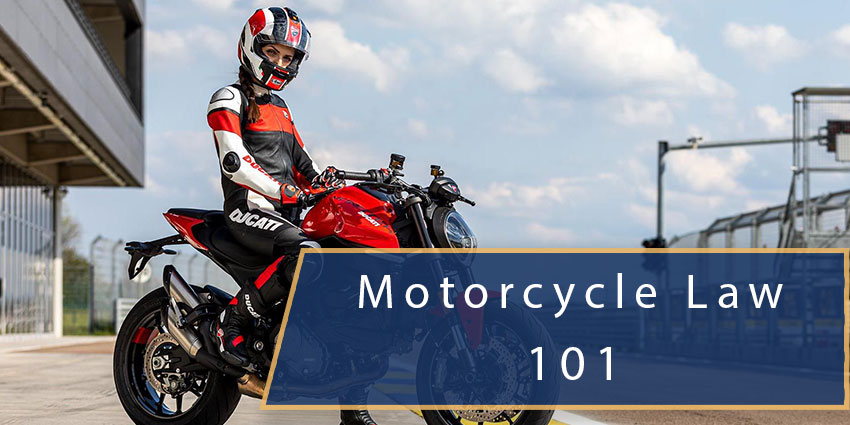Florida is a great place to own and operate a motorcycle, and we see motorcyclists on the streets year-round. But before you ride, you should know and understand the motorcycle laws in Florida. Florida has one of the highest numbers of motorcycle accidents and fatalities in the United States. Accidents involving motorcyclists frequently result in more significant trauma and bodily injuries due to the lack of protection provided by a motorcycle. If you have been injured in a motorcycle accident, you should contact a reputable, trusted personal injury attorney to understand your rights.
When you operate a motorcycle in Florida, you are required to follow all the same laws of the road as any other vehicle. However, there are additional laws that pertain specifically to motorcycles that you must be aware of. Here are some of the most important ones to know.
- Motorcycle License / Endorsement: Anyone operating a motorcycle in Florida must have a motorcycle endorsement from the Florida Department of Motor Vehicles. Anyone who already possesses a Florida driver’s license will be issued a motorcycle endorsement. If you do not have a valid driver’s license, you may qualify for a motorcycle-only license.
- Motorcycle Registration: The license tag of a motorcycle must be permanently affixed to the vehicle and remain clearly visible from the rear at all times. Any deliberate act to conceal or obscure the legibility of the license tag of a motorcycle is prohibited.
- Insurance Requirements: Motorcycle riders in Florida must have $20,000 total bodily injury and $10,000 property damage and per-person bodily injury insurance coverage; and $30,000 single-limit liability insurance coverage.
Table of Contents
Safety Equipment
- Helmet Requirement: Florida law states that any motorcycle rider over the age of 21 who has a valid insurance policy of at least $10,000 in medical benefits is not required to wear a helmet. Any rider under the age of 21 must wear a helmet. Florida law also states that speakers in helmets are permitted when used for communication purposes only. Earbuds and headphones are not allowed.
- Headlights: Daytime headlights must be used for all motorcycle riders in Florida.
- Turn Signals and Mirrors: Florida law requires motorcycles to have working turn signals and at least one rearview mirror.
- Eye Protection: Florida requires that all motorcyclists wear protective ear covering when operating a motorcycle. This includes nighttime driving as well as during the day.
- Handlebar Height: Motorcycle handlebars may not be higher than the driver’s shoulders when they are seated on the motorcycle.
- Seats: Motorcycle riders must have a permanent and regular seat attached properly to the motorcycle and may not carry any other passengers unless the seat is designed for the additional person. Furthermore, motorcycle riders must sit properly astride the seat with one leg on each side of the motorcycle, and with both wheels on the ground at all times.
- Two Motorcycle Riders: In Florida the law allows two motorcycles to ride next to each other on roads and highways. Other motorists are required to give the riders a full lane.
- Passing Other Vehicles: Motorcycle riders are not permitted to pass other vehicles in the same lane, just as a car is not permitted to pass a smaller vehicle using the same lane. A motorcycle is not permitted to operate between lanes or rows.
- Passengers and Packages: Motorcycle riders may not operate a motorcycle with a passenger in a position that may interfere with the operation or control of the motorcycle. Additionally, a rider may not carry any package or another item that prevents them from keeping both hands on the handlebars.
Operating a Motorcycle
In addition to these laws, motorcycle riders must follow all the same laws as any other vehicle on the road. When an accident occurs, determining if you are eligible to receive compensation is determined in much the same manner as any other car accident. If you have sustained an injury resulting from an accident, it is important to take the necessary steps to protect your rights to recover damages from your losses.
You should notify the police immediately after an accident. The official police report is a critical piece to any accident injury claim. You should also try to collect as much evidence as possible on your own. Evidence such as pictures of the scene, the parties involved, and damage to vehicles and your motorcycle. Collect witnesses’ names and contact information whenever possible. And, of course, get medical attention immediately. Keep complete records of all medical treatment you receive, including the names of providers, dates and times, medications, and all treatments.
CONTACT A PERSONAL INJURY ATTORNEY
If you or a loved one has been injured in a motorcycle accident, then you should take the appropriate steps to ensure you receive the compensation you deserve. Contact a trusted, respectable personal injury attorney today.
For over 60 years our firm has been successfully helping people who have been injured due to someone else’s carelessness. We have been nationally ranked for decades by US News and World Reports as a Tier 1 law firm, which is the highest-ranking that can be received. Sean McQuaid and Jonathon Douglas have dedicated their careers to continuing the firm’s legacy of superior legal representation.
Remember that we never charge a fee unless we win. Call us today so that we may answer your questions, help you navigate the complexities of insurance claims, and recover the compensation that you deserve.
We work hard to make sure each and every client gets the attention that they deserve. We appreciate feedback from our clients and reviews are validation of our work. Every 5-star review that we receive lets us know that our services were appreciated by our clients.














